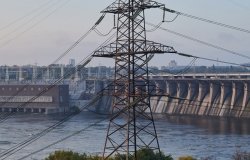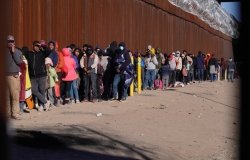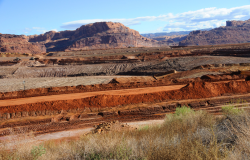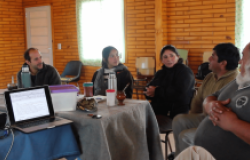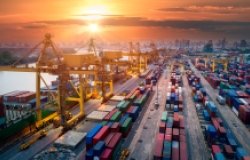The Future of U.S.-EU Energy Cooperation
Chief of staff at the Office of the Special Envoy for Eurasian Energy at the U.S. Department of State, Vincent J. O'brien, stated that "stakes for an energy secure future have never been higher than they are today." Cooperation is needed on securing new resources of natural gas, diversifying energy sources and creating a more integrated European energy market. Given that the U.S.–EU trade relationship is the largest in the world and that the economies are increasingly becoming interdependent, Europe's energy security is naturally in the best interest of the U.S. While the dynamics behind Europe's energy concerns are complex, pipeline politics seem to dominate discussions.
Overview
Chief of staff at the Office of the Special Envoy for Eurasian Energy at the U.S. Department of State, Vincent J. O'brien, stated that "stakes for an energy secure future have never been higher than they are today." Cooperation is needed on securing new resources of natural gas, diversifying energy sources and creating a more integrated European energy market. Given that the U.S.–EU trade relationship is the largest in the world and that the economies are increasingly becoming interdependent, Europe's energy security is naturally in the best interest of the U.S. While the dynamics behind Europe's energy concerns are complex, pipeline politics seem to dominate discussions.
To help combine efforts and formalize ongoing discussions between the U.S. and the EU on these issues, the creation of a U.S.–EU Energy Council was realized in November of 2009. The Council is divided into three main working groups addressing: energy security and new markets to help secure new natural gas resources; standards and policies to harmonize the ongoing work on electric cars, smart grids and other technologies; and technical research and development to cooperate on research for carbon capture and storage, rare earths and renewable technologies.
Ulrich Eckle noted that the need for the Council originated in part from Europe's necessity to find alternatives to the dependency on Russian gas sources. Russia is increasingly leveraging gas supplies as a domestic and foreign policy tool, which increases risk to EU markets. Eckle sees cooperation with the U.S. as vital for diversifying resources through consultation on energy policies that will establish standards and efficiency, and by continuing to work together on renewable energy. As Europe looks to meet its long-term gas requirements, sources in the Black Sea-Caspian region should be added to the picture, as well as Iran, which has the world's second largest natural gas reserves and could become a viable player if the political environment changes.
Jeffery Piper was apprehensive about the lack of infrastructure holding an integrated EU energy market together. The issue, as he sees it, is that it is difficult to agree on who will bear the costs for this public good. With 27 member states having their own priorities and interests, progress has been slow in creating a common approach on energy issues. Unfortunately, he states, it took the gas crisis in 2009, when millions of homes went without heat in the winter due to a standoff between Russia and Ukraine over a price dispute, to bring the EU member states to the table.
In an effort to integrate gas networks, the EU is expanding its internal market toward southeast Europe and engaging the Western Balkans through the Energy Community Treaty. A big step in this direction was signing the Protocol of Accession to the Community with Ukraine last year, which will help to reform Ukraine's energy market to EU standards and create a more stable, efficient and transparent energy market.
Alexandros Petersen spoke about the development of the Southern Energy Corridor, which is intended to bring a network of natural gas pipelines from Caspian and Middle Eastern resources through Turkey to European consumers, avoiding the disruptions and geopolitical machinations that create risks for Russian and Ukrainian routes. Currently there are several pipeline projects, but he believes that a choice between the Western-oriented projects will be made soon by the Shah Deniz gas consortium in Azerbaijan. If the project is going to reach its full potential, the U.S. and EU will have to work together on harmonizing their approach to gas-rich Turkmenistan, resolving challenges with major producer Iraq and cooperating to determine whether North America's shale gas revolution can be replicated in Europe.
An important note to remember, according to Piper, is that the EU is not looking to replace Russian gas, but to include additional sources that help support global markets. As the Council progresses, the hope is that it will become a useful tool to developing a coordinated approach to the challenges and goals of achieving global energy security.
By Andri Peros. Edited by Nida Gelazis
Christian Ostermann, Director, European Studies and History and Public Policy
Speakers

Alexandros Petersen
Ulrich Eckle
Vincent J. O'Brien
Jeffery Piper
Hosted By

Global Europe Program
The Global Europe Program is focused on Europe’s capabilities, and how it engages on critical global issues. We investigate European approaches to critical global issues. We examine Europe’s relations with Russia and Eurasia, China and the Indo-Pacific, the Middle East and Africa. Our initiatives include “Ukraine in Europe” – an examination of what it will take to make Ukraine’s European future a reality. But we also examine the role of NATO, the European Union and the OSCE, Europe’s energy security, transatlantic trade disputes, and challenges to democracy. The Global Europe Program’s staff, scholars-in-residence, and Global Fellows participate in seminars, policy study groups, and international conferences to provide analytical recommendations to policy makers and the media. Read more

History and Public Policy Program
The History and Public Policy Program makes public the primary source record of 20th and 21st century international history from repositories around the world, facilitates scholarship based on those records, and uses these materials to provide context for classroom, public, and policy debates on global affairs. Read more
Thank you for your interest in this event. Please send any feedback or questions to our Events staff.





